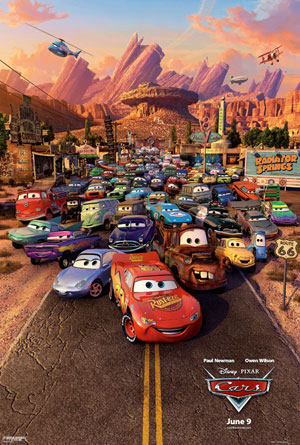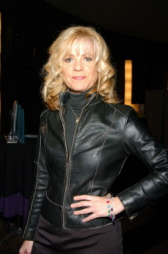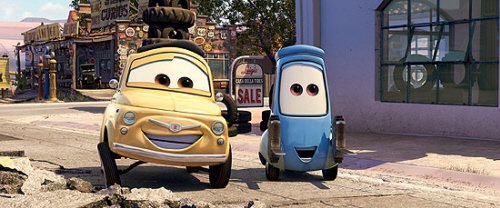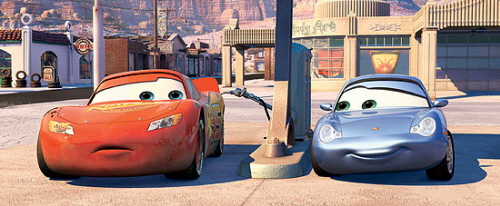 Bonnie Hunt is one of those people who should be more famous. Yet it seems like the comedienne can’t catch a break – she’s starred in a succession of cancelled TV shows over the years (none of which are coming to DVD any time soon, she told me after this interview; not even The Building, possibly the best of the bunch, and one of the all-time great cancelled shows), and seems relegated to character parts in movies.
Bonnie Hunt is one of those people who should be more famous. Yet it seems like the comedienne can’t catch a break – she’s starred in a succession of cancelled TV shows over the years (none of which are coming to DVD any time soon, she told me after this interview; not even The Building, possibly the best of the bunch, and one of the all-time great cancelled shows), and seems relegated to character parts in movies.
Until now – Bonnie Hunt is the romantic lead in Cars, where she plays a hotshot Los Angeles lawyer Porsche who burns out on big city life and finds her way to rustic Radiator Springs, a town that fell into disrepair when the new interstate sucked the life out of Route 66. Hunt’s character may be new to town, but she’s enamored with the history of Radiator Springs and ‘the Mother Road.’
Then Owen Wilson’s Lightning McQueen shows up in town, and against her better judgment she starts falling for him…
Cars opens this weekend.
Q: What was you first car?
Hunt: That I bought myself personally? It was 1985 and I bought a 1975 Ford Granada, with a hole in between the gas and the brake. It was $400 and I paid for it a $100 a month for four months from a neighbor who had it sitting in the garage. It had no gas gauge and no heat, and I used to have to scrape the inside of the windshield in the winter and literally, I would wear my older brother’s parka over my student nursing uniform and eight pairs of socks. It was a real fiasco. Just getting in the car was like you were getting ready to climb a mountain.
Q: Did it just break down on the side of a road and you never decided to return it?
Hunt: Actually, I sold it to another kid in the neighborhood.
Q: How Much?
Hunt: Oh nothing, maybe like $20, literally to just take it off our hands. That car was such a piece of junk, but I was so happy that I owned a car and that it was going to get me where I was going.
Q: What was it like to be cast as the romantic lead opposite Owen Wilson?
Hunt: Well it figures that the first time I get to play the lead girl in a movie is animated. But it is the best body I’ve ever had on film. I’m grateful for that. It was a lot of fun. Pixar is all about the heart and soul of the character. When John Lasseter calls me and I see his name on the caller ID, I just say yes. I don’t even say hello. I admire and respect him, and certainly Joe Ranft, who was a big part of this film and a big part of Pixar. It’s a creative oasis. When you’re at Pixar, for me creatively, I’m inspired, included, a collaborator and a student. It’s what you dream what showbiz would be. It’s kind of why I got into the business and you discover it’s really different. They really respect their creative process and the people involved. bout the good old days when we used to come to the racetracks with all the
bout the good old days when we used to come to the racetracks with all the
Q: Were you able to work with Owen in person at all?
Hunt: Yeah. Owen’s really funny. We get each other and we were able to record with each other for a lot of our stuff, so that was fun.
Q: What was he like?
Hunt: He’s Owen. He’s kind of like that guy in high school who’s like, (laid back voice) "Yeah, sure if you guys are going to lunch, I guess I’ll go. I’m a victim of circumstance."
Q: Did you get to have any input into your character and the story?
Hunt: Yeah, I was really fortunate. For me, these Pixar films are four to five years in the process. I’m involved in the very beginning, fortunately enough. John’s so passionate; he comes to you with the first drawings of it. These drawings to them are simple drawings but to me, it’s like Picasso. I’m always so in awe of them picking out a few colored pencils and bringing something to life in front of your eyes, like, "She’s a little bit like this, or maybe she’ll be like that." It’s incredible. It’s so great. It’s a group of these incredible people that work as a team and nobody even knows their faces or sees them. It is about the passion, the storytelling, and the technical achievement for these guys, and the artistry. That is what’s at the core of it because nobody is going to know who they are. It’s what drives them.
Q: When you’re in the booth do you find yourself doing any kind of improv?
Hunt: Yeah, definitely. John will always encourage that in me. I’m thrilled to have that respect and courage. The fact of the matter is that as an actor, improvisation or storytelling is not just something freewheeling off the top of your head. For me, it’s always character driven with respect to the story and exploring and heightening what has already been given to me. So it’s like a bonus feature. If they want to use it, they can. If they don’t, they don’t have to. John always embraces it. In this situation, he even took it to a new level.
Q: What are some examples of things you added to the dialogue on your own?
Hunt: The lines are pretty blurred for me. I don’t chalk them up. There’s stuff that’s a part of me but I think I’d rather have John tell you. I’m not comfortable saying, "I thought of this" or "I though of that." It’s kind of weird. I’ll tell my mom. That’s for sure. She’ll never hear the end of it.
Q: Were you familiar with NASCAR at all before the movie?
Hunt: I know about NASCAR, certainly, and the character of NASCAR which is entertaining in itself. It’s like any big tailgate event. I’m a Cubs fan so I totally relate to the mentality and the group fever and the excitement and I think that’s a great character setting in this film. Everybody in our country can relate to that group mentality and enjoyment. Then there’s all these three dimensional characters within it and then on top of that, a slight reminder of it’s not a bad idea to stop and think and reflect in the moment once in a while, which is so hard to do in today’s world. It’s just go, go, go. Everything’s instant. I find that even when I’m writing now, if I’m writing a TV show or movie, it’s like, "Oh, a person just can’t mail a letter and wait to see if they get it. Or the phone line’s busy and so I can’t get through." When you’re writing a story even about love, it’s so hard. No wonder it’s hard to even live it. It’s different.
Q: What do you do to sit back and take in life easily?
Hunt: Well, I have 15 nieces and nephews and a child is always a great reminder of how simple things can be, and how grateful we should be. And then I love gardening. That’s something I really find almost like a drug.

Q: IMDB has you writing the Mrs. Doubtfire sequel. How’s that coming along?
Hunt: Wrote it. Delivered it a while ago. I’m really proud of it, but was really scared to do it because I felt like what’s the purpose? But it seemed like a challenge I couldn’t resist. Robin [Williams] was interested in Don Lake and I doing it. I’m really proud of the script. My comedy always starts with the truth and it was hard to find the truth. How do you bring Doubtfire back when everybody knows about Doubtfire? So it was a big crossword puzzle to solve but it was definitely worth it. We had a great time but I don’t know if they’ll ever make the movie. I hope they do but it’s been a long time. It’s been like 13 years but I don’t know what the odds are of it getting made but I hope it is because I’m really proud of the script.
Q: Can you talk about what you did do to continue the story?
Hunt: I don’t know. I don’t know if they’d want me to. I don’t even know if it’s a gleam in Robin’s eye right now. The last thing I read about him talking about it said he wasn’t going to do it. So it might not even be an issue. But I’m definitely proud of the script.
Q: You mentioned that you write to seek the truth. What’s your writing process like? Do you start with a story, a concept, or specific jokes you want to work in…?

Hunt: I kind of don’t write jokes but I know what you’re talking about as far as humor goes. All my humor usually comes from the truth or an exaggeration of the truth. For me, and any movie I’ve done, whether it’s The Green Mile or Jerry Maguire or Return to Me, I feel like my humor comes from the accessibility or the identifiable nature of us as people. It’s kind of what I draw from because I didn’t have any acting classes under my sleeve. I’ve never been trained in that respect but I was a nurse for five and a half years and I’ve lived a little bit. I kind of take that on my journey when I’m writing. I write from an emotional place. Even this sitcom I just did, this pilot I did for ABC, it’s not on the fall schedule but I was so proud of it. It was thought provoking, it was moving, it was really funny and smart. It’s different for a sitcom. The chances are probably low sometimes that something like that will get on the air but it’s all I know how to do. I can’t really write towards a demographic. I tried it but then it’s like that nightmare homework assignment where you wait til the last minute. No matter how hard you try, you just can’t do it well. I just can’t do that part well, it’s much better coming from whatever the truth is for the characters I’ve created in my head.
Q: Were you nervous about going back to TV after your experience with your other shows?
Hunt: You’re right. I was a little bit nervous about doing it again because I’ve done so many shows. I’ve written and produced three series and I’m proud of every one of them. They were always critically acclaimed and each one lasted a little bit longer than the last one. This time, ABC called me and asked me to come back. So I said, OK, I’ll give it a shot. But I was worried about it because what are the odds? Forget it, and I was right. But I got to work with all my friends, people I really respect. Some people I admire, like Dennis Miller, I didn’t know but I wrote a part that I thought he’d be funny in as my therapist and he was fantastic. He’s this sardonic, edgy therapist and it was so great. It’s a really smart funny show. I hope it sees the light of day because I really want to show it to an audience. But at the end of the day, you just have to be really proud of your work. Same with you guys. We plug along, we do the best we can and you just can’t go, "Oh, can’t do it, too hard." Because you got to work.
Q: Could the show see the light of day as a mid-season replacement?
Hunt: I’m really hoping for that, I really am. Especially with my mom still around. I would like for her to see one of my shows hang in there. Believe me, when they’re cancelled, there’s nobody more hurt than your mother. She still calls me, "I don’t understand. Does anybody think about putting ‘Life with Bonnie’ back?" I go, "Ma! It’s been two years! The show is gone!" But in her head, it’s alive. She’s my mom.
